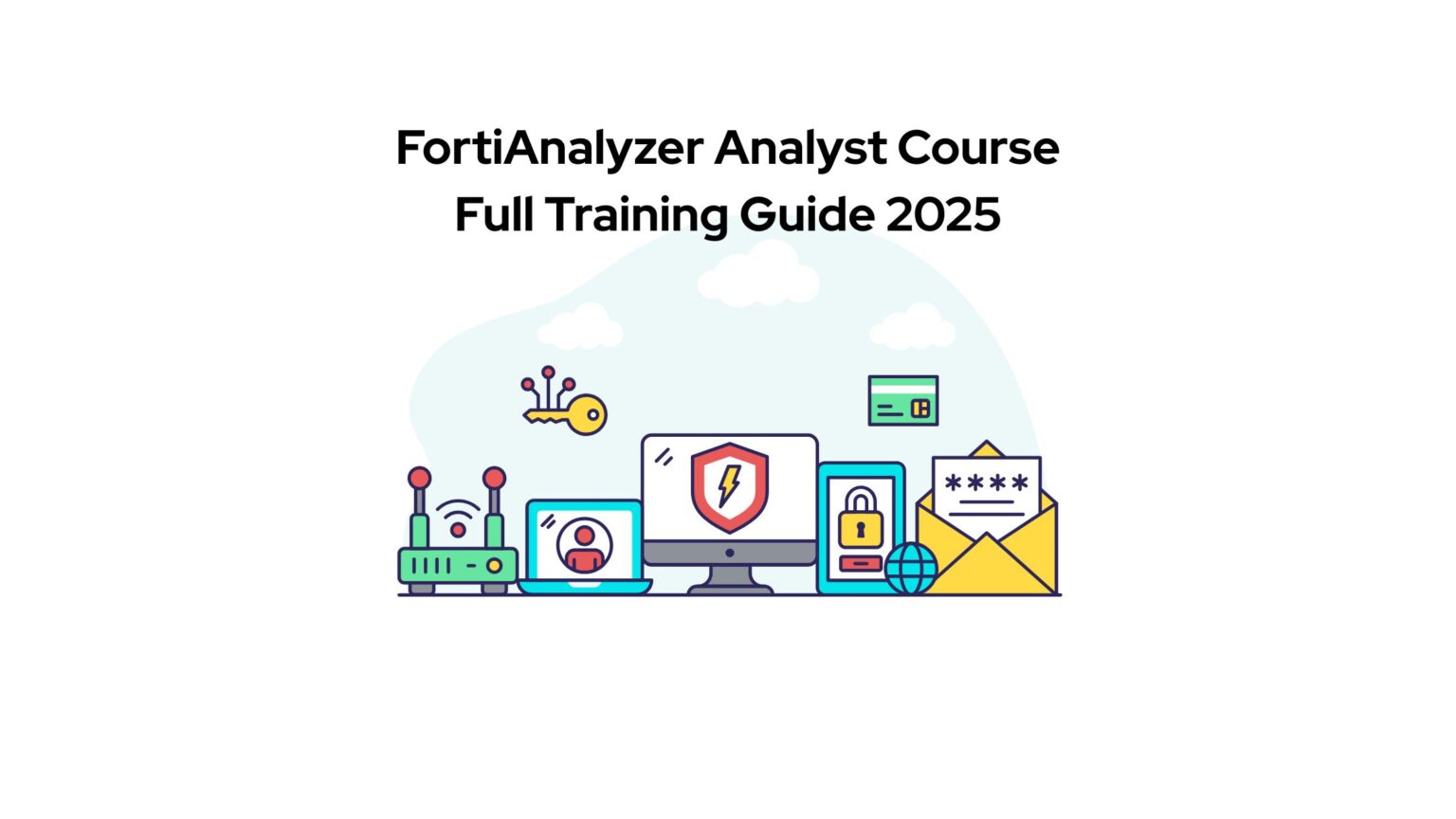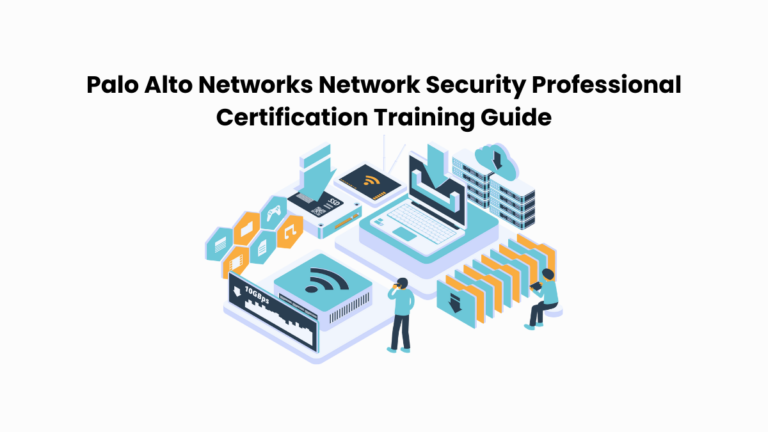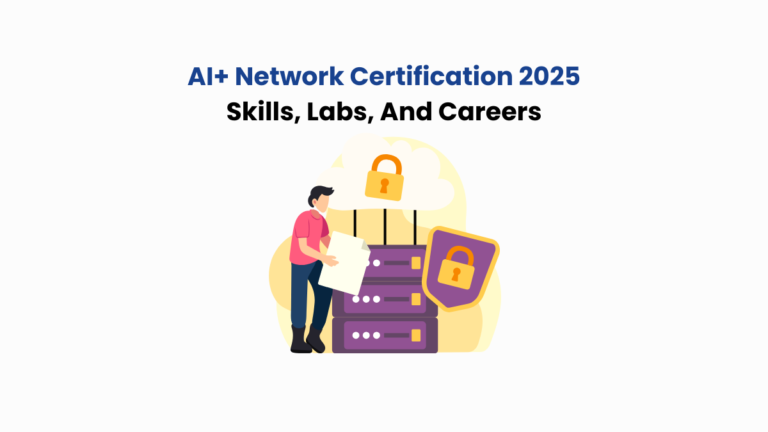As an analyst, you are expected to spot threats faster, generate actionable reports, and automate incident response without breaking a sweat. But the truth is, managing logs, reports, and event data across the Fortinet Security Fabric can feel overwhelming. This is especially felt when every alert demands context and every report needs precision.
That is where the FortiAnalyzer Analyst course comes in. Designed for professionals like you, this training dives deep into centralized logging, event correlation, and automation using playbooks. This course can equip you to work smarter, not just harder.
Delivered by Datacipher Education Services, an authorized Fortinet training partner trusted across APAC, this course blends expert instruction with hands-on labs to prepare you for real-world SOC challenges.
In this guide, you will learn what the course covers and other details, so you can decide if this is the right next step for your security career.
Who the FortiAnalyzer Analyst Course Is Actually For?
This is not a general introduction to cybersecurity tools. And it is definitely not for someone just getting familiar with Fortinet’s ecosystem.
The FortiAnalyzer Analyst course is built for security professionals who already operate in high-stakes environments. Here, every log matters, every alert demands a response, and reporting is mission-critical.
This course is for you if:
#1. You are tasked with making sense of massive log volumes and need sharper tools to filter noise from signal.
#2. You are responsible for building reports that matter to both technical and executive teams.
#3. You are stepping into a SOC role and need to master threat hunting, incident management, and automation inside Fortinet’s ecosystem.
#4. You are preparing for the FCP – FortiAnalyzer 7.4 Analyst exam and want hands-on, practical training that reflects real-world demands.
If any of the above resonates, then this course is exactly where you need to be.
FortiAnalyzer Analyst Course Overview
Here is the breakdown of the course details:
| Feature | Details |
| Course Duration | 8 hours total (4 hours lecture, 4 hours lab); delivered as one full day or two half days |
| Delivery Format | Instructor-led (online or classroom) and self-paced online |
| Course Level | Intermediate |
| Target Audience | Security professionals, SOC analysts, and network administrators responsible for Fortinet Security Fabric analytics and threat response automation using FortiAnalyzer |
| Prerequisites | Familiarity with FCP-FortiGate Security and FCP-FortiGate Infrastructure content. Basic knowledge of SQL SELECT syntax is helpful. |
| Course Fees | INR 418,640 or USD 5000 |
What Does the FortiAnalyzer Analyst Course Entail?
The FortiAnalyzer Analyst course is for professionals who need to turn logs into insights and support real-time SOC operations using Fortinet’s centralized analytics platform. This course gives you the practical skills to search and analyze logs, investigate incidents, build actionable reports, and create automation playbooks that scale with your network.
You will work directly with FortiAnalyzer 7.4.1, learning how to use it in real-world security environments. There will be no guesswork or overreliance on default configurations.
The key modules covered in this course are:
- Introduction and Initial Access
- Logging
- Incidents and Events
- Reports
- Playbooks
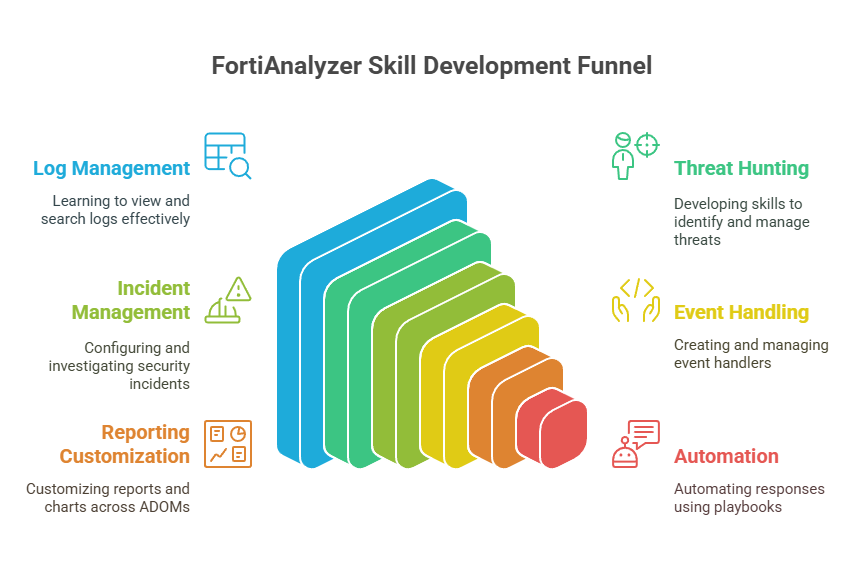
By the end of this course, you will be able to:
a. Understand core FortiAnalyzer features and log management capabilities.
b. View and search logs using Log View and FortiView.
c. Perform threat hunting tasks and manage outbreak alerts.
d. Configure and investigate security incidents.
e. Create and manage event handlers.
f. Customize reports, datasets, and charts across ADOMs.
g. Automate responses using playbooks.
h. Troubleshoot report generation and storage.
In a SOC environment, theory alone will not cut it. That is why the FortiAnalyzer Analyst course includes four full hours of lab time, half of the total course duration. These labs are designed to simulate real security operations using FortiAnalyzer 7.4.1. By the end of the course, you will not just know what FortiAnalyzer can do, but you will also know how to use it when it counts.
What Comes After the FortiAnalyzer Analyst Course?
Once you complete the FortiAnalyzer Analyst course, your next logical step is to take the FCP – FortiAnalyzer 7.4 Analyst certification exam. It is part of the Fortinet Certified Professional – Security Operations track. It validates your ability to perform log analysis, manage incidents, and automate SOC tasks within the Fortinet Security Fabric. You can find the exam details here.
FortiAnalyzer Analyst Course Outcomes: What You Walk Away With?
In fast-moving SOC environments, reactive logging is not enough. You need precision, automation, and actionable insights at scale. That is exactly what this course delivers.
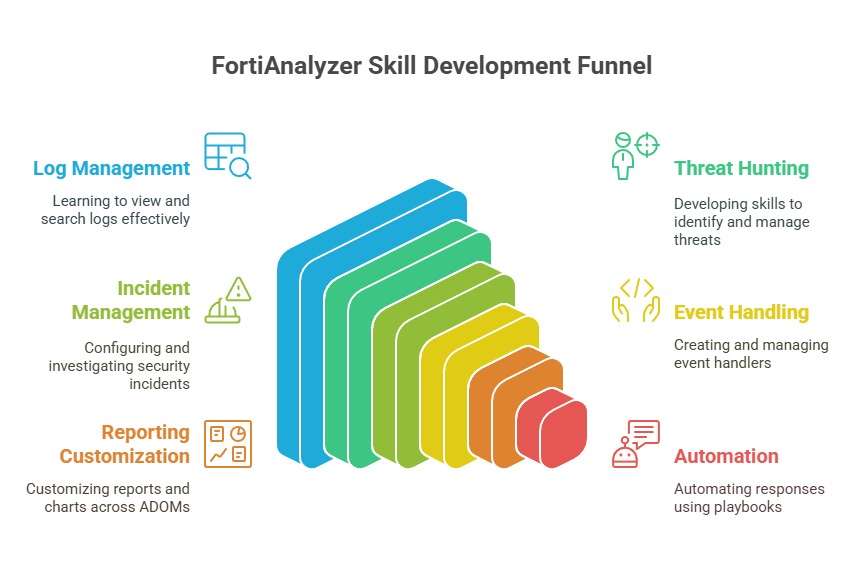
After completing the FortiAnalyzer Analyst training, you will walk away with:
#1. The ability to collect, search, and analyze logs using Log View and FortiView.
#2. Confidence to detect threats and generate incidents using custom event handlers.
#3. Practical expertise in automating responses with playbooks tied to real-world alerts.
#4. Deep understanding of reporting across ADOMs, including custom charts and datasets.
#5. Skills to troubleshoot, optimize, and extend FortiAnalyzer functionality across your Security Fabric.
This course is more than just a credential; it sharpens your edge as a modern SOC analyst.
How to Enroll in the FortiAnalyzer Analyst Course?
Getting started with FortiAnalyzer training is simple, whether you prefer live sessions or flexible, on-demand learning.
#1. Visit the Fortinet training portal or the Datacipher website
You can enroll in the FortiAnalyzer Analyst course through the Fortinet Training Institute or directly via the Datacipher website. Both platforms offer guided support and course availability.
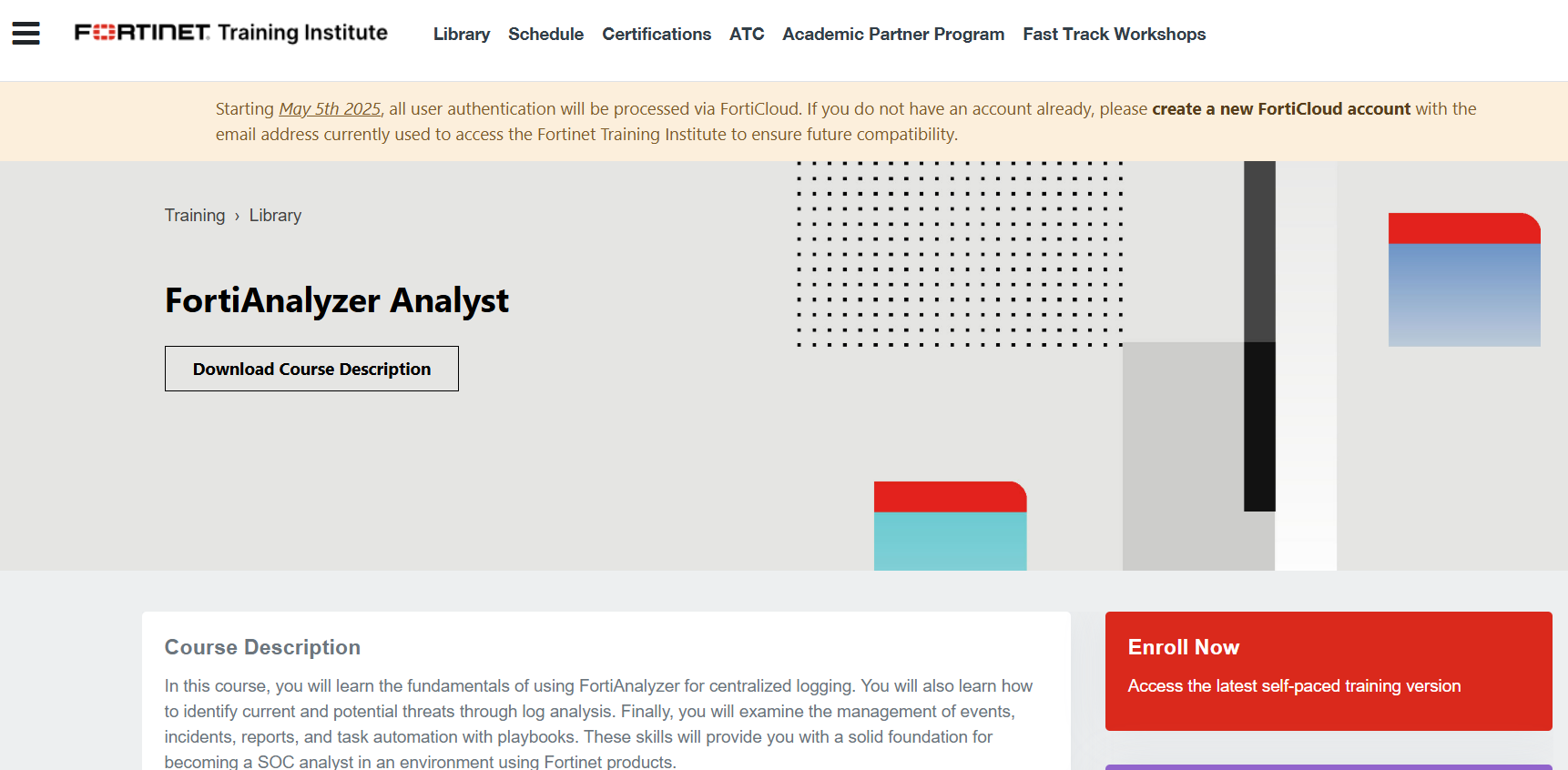
Source: Fortinet
#2. Choose your training format
- Instructor-led (ILT): Participate in real-time sessions led by certified trainers, either virtually or in person.
- Self-paced: Learn at your own pace with pre-recorded content and optional lab access for hands-on practice.
#3. Check the prerequisites
Make sure you are already familiar with FortiGate Security and Infrastructure concepts. Some knowledge of SQL SELECT syntax is also helpful.
#4. Access courseware and labs
Once enrolled, you will receive official Fortinet training material and gain access to labs that mirror real-world SOC workflows.
Why Choose Datacipher for Your Fortinet Training?
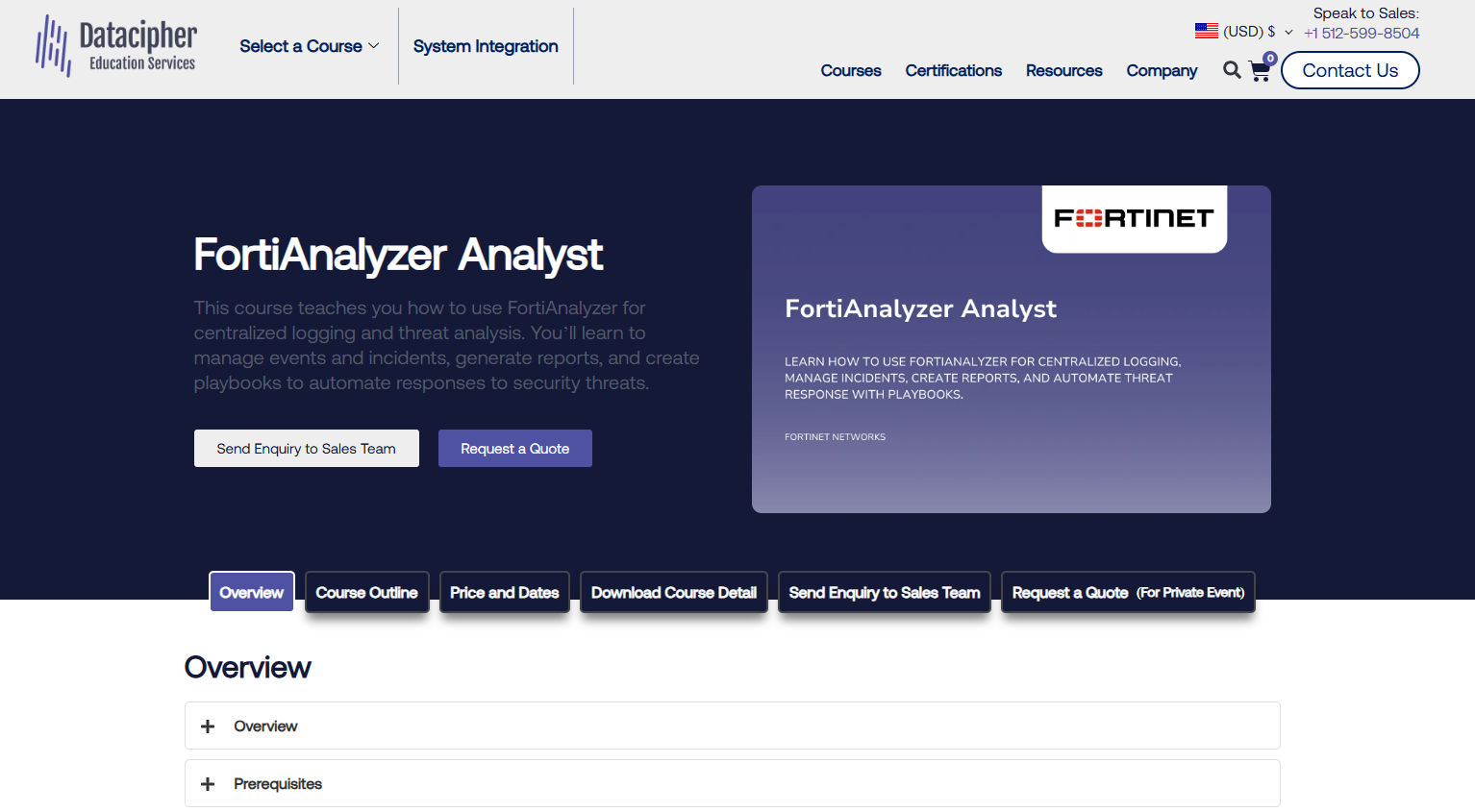
Source: Datacipher
When you are analyzing incidents, hunting threats, and automating SOC workflows, there is no room for shallow training. You need real-world skills that translate into operational confidence fast.
At Datacipher, we deliver exactly that. We bring frontline deployment experience into every FortiAnalyzer training session. That is why enterprises like Ericsson, Bharti Airtel, HCL, and Tech Mahindra trust us to skill up their security teams.
Here is what sets us apart:
- Instructor-led sessions taught by engineers who have worked with FortiAnalyzer in the field
- Labs that mirror real SOC environments, not sanitized demos
- Personal support from the moment you register to post-course mentoring
- Flexible scheduling built around your professional life
- A deployment-first approach that sharpens your response in live environments
And here is what professionals say after training with us:
“I walked away knowing exactly how to use FortiAnalyzer in our SOC, not just how to pass the exam.”
— Rakesh Verma, Senior SecOps Analyst, HCL
Some providers teach for exams. We train for impact. Get hands-on with FortiAnalyzer and lead from the front. Enrol with us today.
Frequently Asked Questions
1. How does FortiAnalyzer improve threat detection and incident response in SOC environments?
FortiAnalyzer correlates logs across the Fortinet Security Fabric, enabling faster threat detection and root-cause analysis. It helps analysts prioritize incidents using real-time event handlers and automated alerts. Playbooks further streamline response actions, reducing manual effort. The result is faster, smarter, and more consistent SOC operations.
2. Can mastering FortiAnalyzer help me transition from network admin to SOC analyst?
Yes, FortiAnalyzer bridges the gap between infrastructure visibility and security intelligence. By learning how to analyze logs, manage incidents, and automate responses, you gain core SOC skills. It’s a natural step up from managing networks to defending them. This course builds exactly the expertise hiring managers look for in analysts.
3. How does FortiAnalyzer integrate with other Fortinet tools like FortiSIEM or FortiManager?
FortiAnalyzer acts as a centralized logging and analytics engine within the Fortinet ecosystem. It pulls data from FortiGate, FortiManager, and FortiClient for unified visibility. When integrated with FortiSIEM, it enhances correlation and threat intelligence. Together, these tools create a powerful, automated Security Fabric.
4. What kind of career paths open up after getting certified as a FortiAnalyzer Analyst?
This certification strengthens your qualifications for SOC analyst, security operations engineer, or incident responder roles. It also supports upward movement toward threat intelligence and security automation positions. With Fortinet’s market adoption, certified professionals are in high demand. It’s a foundational step in building a high-paying cybersecurity career.
5. How does FortiAnalyzer compare to other log management or SIEM solutions in the market?
FortiAnalyzer offers deep integration with Fortinet products, which many third-party SIEMs cannot match. It provides threat intelligence, real-time analytics, and automation without needing external connectors. While not a full SIEM, it’s highly efficient for Fortinet-centric environments.

